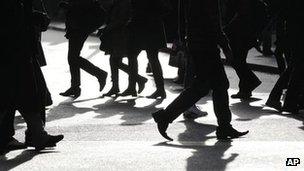Immigration from outside the EU 'linked to UK jobless'
- Published

There is a vigorous debate going on about the impact of migration
The government's official advisers on migration say there is a link between immigration from outside the European Union and job losses among UK workers.
The Migration Advisory Committee said there were 23 fewer UK jobs for every 100 migrants from outside the EU.
But a separate report from the National Institute of Economic and Social Research (NIESR) says immigration has had little impact.
The government said it was working to reduce net migration.
Focus on 'well-being'
The Migration Advisory Committee (Mac) estimates 160,000 British-born workers' jobs have been "displaced", external following non-EU immigration between 1995 and 2010.
The impact and displacement of British workers does not last forever, it found.
"Those migrants who have been in the UK for over five years are not associated with displacement of British-born workers," it said.
The committee also looked at the effect of migration on salaries, and found overall wages for the most well-paid people went up, while those at the bottom went down.
The report also added that EU migration had had "little or no impact" on the native employment rate.
Mac chairman Professor David Metcalf said it was difficult to identify the occupations which would be most affected.
But he highlighted information and communications technology, hospitality and retail as sectors which could see the most impact.
Health and care services have also employed large numbers of migrants, he said, but this was mainly at a time of shortage of UK workers so British jobs were unlikely to have been displaced.
He said: "Assessing the impacts of migration is not a simple decision and our conclusions will require careful consideration by the government."
But considering overall GDP did not present a "true picture", he said.
"Instead, the impact of migration on the economic well-being of the resident population should be the focus.
"Impact assessments must also consider wider effects such as the effects of skills transfer from migrants and their impacts on public finances, employability of UK workers, housing and transport.
"Although difficult to measure, these will ensure we can better understand the effects of migration."
Dr Scott Blinder, senior researcher at the Migration Observatory at the University of Oxford, agreed.
"This report highlights the need to decide and articulate more clearly whose needs government is prioritising when developing immigration policy," he said.
"Trade-offs need to be confronted head on.
"Without more debate and clarity about whose interests policy is trying to maximise, we cannot hope to reach more agreement about the costs and benefits of specific policies."
Immigration Minister Damian Green said: "This government is working to reduce net migration from the hundreds of thousands a year we saw under the last government, to the tens of thousands we saw in the 1990s.
"Controlled immigration can bring benefits to the UK, but uncontrolled immigration can put pressure on public services, on infrastructure and on community relations.
"This report makes clear that it can also put pressure on the local labour market."
'Strong work ethic'
Earlier the National Institute of Economic and Social Research (NIESR) said there was "no association" between migration and the numbers of people claiming unemployment.
The study looked at the number of migrants given National Insurance numbers, external between 2002-3 and 2010-11 and compared them with the number claiming unemployment benefits.
The NIESR said: "The results show a very small negative and generally insignificant correlation between the migrant inflow rate and the change in the claimant count rate.
"For all practical purposes, these results suggest that migration has essentially no impact on claimant count unemployment."
But it said it was still not known whether an increase in the number of migrants coming to the UK leads to a fall in the number of low-skilled jobs for British workers which is masked by more jobs for highly skilled Britons.
Migration Watch UK, which campaigns for tighter immigration controls, welcomed the report.
Sir Andrew Green, Chairman of Migration Watch UK, said: "This is a thoroughly professional report.
"The committee has had the courage to say straight out that immigration can add to unemployment, especially during a recession.
"They are also right to draw attention to impacts that are harder to quantify - such as housing and congestion."
- Published9 January 2012
- Published23 November 2011
- Published24 November 2011
- Published1 January 2012